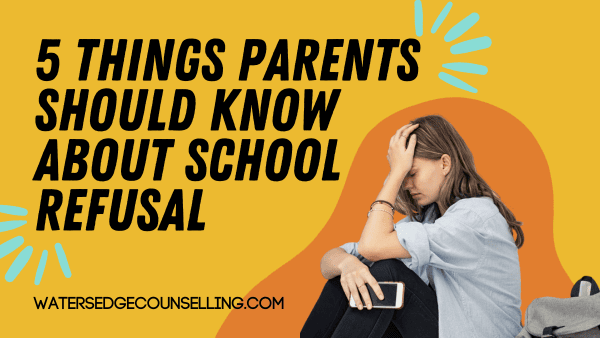
It is normal for kids to resist going to school every so often. Parents and caregivers have to become detectives and figure out what is really going on, all the while making sure their child eats breakfast, gets dressed and gets out the door in time for the first bell! Easier said than done, right? And in the past, the assumption was that short of being really sick, a child needs to push through and get over it. But with so many young people experiencing school refusal, we need a better solution.
New data tells us that 2 in 5 families in Australia have experienced school refusal in the past year, while 1 in 3 parents have dealt with it. This is a widespread issue that is affecting the quality of life for many people.
This leaves caregivers in an impossible position, trying to advocate for their kids while making sure they have a quality education. And going too far in either direction – all or nothing – can harm your kids even more. So what can a caregiver or parent do to get through school refusal? This is not one size fits all, but these five points will give you direction.
- Try to understand that school refusal isn’t about rebellion or laziness
It’s easy to blame school refusal or teenage angst or a test they don’t want to take, but that doesn’t get to the root of the issue. If a child is consistently refusing to go to school, there is a deeper and more important reason. They may be living with a mental illness, experiencing bullying, are struggling with their schoolwork, or more. Perhaps they need additional supports at school, which are not currently provided. Move your stance from defiance to empathy, and the two of you can work together through this.
- The pandemic affected children’s resilience
Back in your day you may have been made to go to school on deaths door, your emotional and physical wellbeing had to build up resilience to get through. But kids today have grown up in a very different world. Not only are they more aware and informed than ever before thanks to social media, but their experience during the COVID-19 pandemic means they went through a global trauma. Like all of us, their resilience and ability to bounce back from struggles, pain and challenges quickly may be in short supply after the past few years. Give them some grace.
- There is no separation between school and home anymore
Between social media, student/parent/teacher communication and schooling from home, it’s fair to say kids can’t just leave school at school. Homework is expected, but many kids experience the fear, anxiety, stress and overwhelm of the school yard 24/7 thanks to TikTok and Snapchat. While you may think they have had a 12 hour break from school over night, they have stayed in fight or flight, trying to ride the rollercoaster of social cues, popularity contests and educational pressure.
- What happens at home directly affects how students behave at school
We know that what happens at school can affects the mental, physical and emotional health of students. But in the same way, what happens at home directly affects a child at school. Financial worries, illness, the death of a loved one, divorce, new siblings, moving home and more will all impact how a child behaves at school. Some kids may act out because they are unable to regulate their feelings, others might shut down and become non-responsive or hyper fixate. This can all lead to school refusal.
- Make returning to school the end goal, but adapt how you get there
Unfortunately, there is no perfect path through school refusal and each child’s journey looks different. As a parent or caregiver, it’s your job to figure out what the best path forward is with them. Speak with the school about what this could look like. Maybe a student needs a period of time off to heal before they return to school, and they can complete their work from home? Perhaps a hybrid home/school arrangement will fit best? Are all the subject’s mandatory, or can you afford to drop some so the student can focus on the key subjects that will move them forward? What if there is a more flexible educational institution nearby, or perhaps home schooling is an option? Maybe the end goal is no longer a high ATAR and entry into a prestigious university, but it becomes graduation or going to a technical school?
If your child refuses to go to school regularly, you’re not alone. This won’t be any easy journey, but it is possible for your family to get through it. And many kids have gone on from this to have healthy, happy and successful lives. You will get there, but for the moment adjust your expectations. Keep communicating with your child, speak to the school, and get your child connected with outside supports like a therapist and a community group. And while you’re at it, make sure you have supports too. Parenting is the greatest privilege of your life, but it is also one of the most challenging things you will ever do.
Does your child experience school refusal? Does your family need some support to get through this rough season? Contact Colleen on 0434 337 245, Duncan on 0434 331 243 or Rachel on 0442177193 for a FREE 10-minute phone consultation on how we can best help you, or press book now and make an appointment.